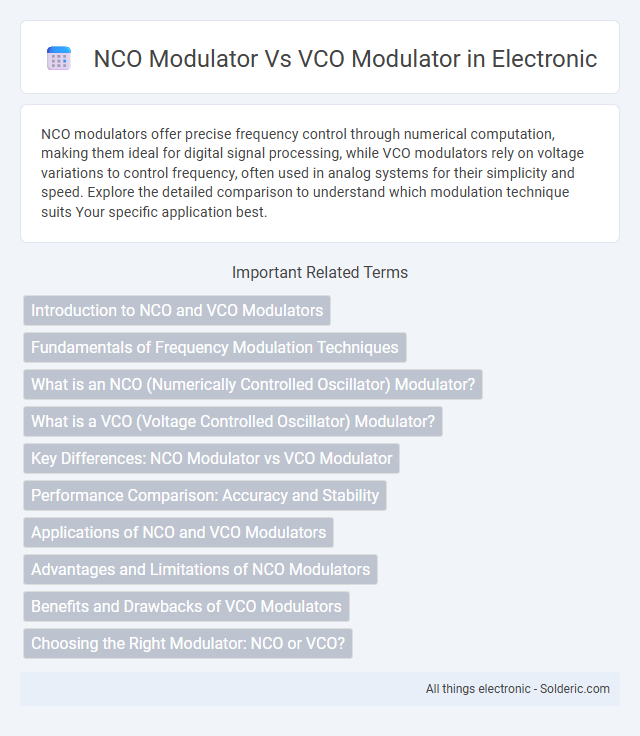NCO modulators offer precise frequency control through numerical computation, making them ideal for digital signal processing, while VCO modulators rely on voltage variations to control frequency, often used in analog systems for their simplicity and speed. Explore the detailed comparison to understand which modulation technique suits Your specific application best.
Comparison Table
| Feature | NCO Modulator | VCO Modulator |
|---|---|---|
| Type | Numerically Controlled Oscillator | Voltage Controlled Oscillator |
| Control Input | Digital frequency word | Analog voltage |
| Frequency Stability | High - precise digital control | Moderate - depends on voltage and temperature |
| Phase Noise | Low phase noise due to digital synthesis | Higher phase noise from analog components |
| Tuning Resolution | Very fine tunability (frequency step size) | Limited by voltage control linearity |
| Integration | Easy integration in digital systems (FPGA, ASIC) | Typically analog circuit, integration harder |
| Output Waveform | Digital sine wave approximations | Analog sine wave |
| Applications | Modern communication, software-defined radio | Older communication systems, analog modulation |
| Power Consumption | Lower in digital implementations | Generally higher due to analog components |
| Cost | Cost-effective with digital ICs | May require expensive analog components |
Introduction to NCO and VCO Modulators
NCO modulators generate precise digital frequency control through numerical synthesis, offering high stability and flexibility in signal generation. VCO modulators rely on analog voltage to adjust oscillator frequency, providing continuous tuning with lower digital complexity but potentially more phase noise. Your choice between NCO and VCO modulators depends on the required signal accuracy and hardware constraints.
Fundamentals of Frequency Modulation Techniques
NCO modulators generate frequency-modulated signals by digitally synthesizing the frequency using phase accumulation and lookup tables, offering precise phase control and stability ideal for digital communication systems. VCO modulators rely on analog voltage control to vary the oscillator frequency, providing easier implementation but often suffering from phase noise and lower accuracy. Your choice depends on requirements for spectral purity and integration in frequency modulation applications.
What is an NCO (Numerically Controlled Oscillator) Modulator?
An NCO (Numerically Controlled Oscillator) modulator generates precision frequency signals using digital phase accumulators and lookup tables, enabling highly accurate and stable frequency control. Unlike VCO (Voltage Controlled Oscillator) modulators driven by analog voltage input, NCO modulators offer improved frequency resolution, fast switching speeds, and reduced phase noise due to their digital implementation. This digital nature makes NCO modulators ideal for applications in modern communication systems requiring precise frequency synthesis and modulation.
What is a VCO (Voltage Controlled Oscillator) Modulator?
A VCO (Voltage Controlled Oscillator) modulator is an electronic component that generates a frequency output directly proportional to an input control voltage, allowing precise frequency modulation in communication systems. Unlike Numerically Controlled Oscillators (NCO), VCO modulators offer analog frequency control, making them ideal for applications requiring continuous frequency variation and fast response times. VCO modulators are widely used in phase-locked loops (PLLs), frequency synthesizers, and RF modulation circuits for efficient signal generation and modulation.
Key Differences: NCO Modulator vs VCO Modulator
NCO modulators generate precise digital frequency control using a numerically controlled oscillator, offering high resolution and stability ideal for software-defined radios. VCO modulators rely on an analog voltage input to vary oscillation frequency, making them more susceptible to noise and temperature variations but suitable for simpler, low-cost applications. Your choice depends on the required accuracy, stability, and implementation complexity in communication systems.
Performance Comparison: Accuracy and Stability
NCO modulators offer superior frequency accuracy and stability due to their digital nature and precise phase accumulator, making them less susceptible to temperature variations and component aging compared to VCO modulators. VCO modulators rely on analog voltage control, which can introduce frequency drift and reduced stability, impacting overall modulation precision. For applications demanding high accuracy in frequency generation, your choice should favor NCO modulators for their consistent performance and minimal phase noise.
Applications of NCO and VCO Modulators
NCO modulators are widely used in digital communication systems, such as software-defined radios and digital signal processors, due to their high precision and flexibility in generating stable frequency signals. VCO modulators find applications in phase-locked loops (PLLs) and frequency synthesis, where their analog nature allows for efficient frequency modulation and rapid tuning. Your choice between NCO and VCO modulators depends on the need for digital agility versus analog responsiveness in frequency control applications.
Advantages and Limitations of NCO Modulators
NCO modulators offer precise frequency control and high spectral purity, making them ideal for digital communication systems requiring low phase noise and stability. Their limitations include limited frequency range compared to VCO modulators and increased complexity in hardware implementation. You benefit from the NCO's accuracy, but must consider its computational demands for real-time processing.
Benefits and Drawbacks of VCO Modulators
VCO modulators offer high-frequency stability and wide tuning range, making them ideal for applications requiring precise frequency control. Their main drawbacks include increased phase noise and susceptibility to temperature variations, which can degrade signal quality. You should consider these trade-offs when selecting a modulator to ensure optimal system performance.
Choosing the Right Modulator: NCO or VCO?
Choosing the right modulator depends on your application's requirements for frequency stability and phase noise performance. NCO modulators offer precise digital frequency synthesis with excellent frequency resolution and stability, making them ideal for software-defined radios and digital communication systems. VCO modulators provide simpler analog frequency modulation with fast tuning capabilities, suited for lower-cost or less complex applications where ultra-high precision is not critical.
NCO modulator vs VCO modulator Infographic

 solderic.com
solderic.com